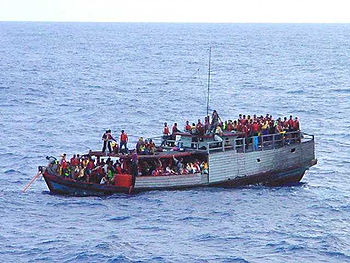"Children Overboard"
 Government of Australia, Defence Department Media Centre. | |
| Date | 2001 - 2002 |
|---|---|
| Location | Australia |
| Interest of | Dennis Richardson |
| Description | The Australian government accused asylum seekers of throwing children into the ocean, which they knew was untrue. |
| Perpetrators | [[|?]] |
See also the SIEV-X sinking
The Children Overboard affair was the manipulation of a shipwrecking which occurred during the 2001 Australian federal election.
In early October 2001, the government accused asylum seekers of throwing children into the ocean in an attempt to blackmail the Australian government into granting them asylum. Even when the government knew it did not occur, they continued to maintain it did.[1]
The manufactured murder accusation, stated with a straight face and emotional tone by the government, was a highly efficient election ploy, and won the government a new term.
The bureaucrat leading the People Smuggling Taskforce was Jane Halton, who later led the National COVID-19 Coordination Commission.
SIEV X
- Full article:
 SIEV-X sinking
SIEV-X sinking
- Full article:
A very closely connected incident is the SIEV-X sinking, where a boat carrying over 400 asylum seekers en route to Australia capsized in international waters killing 353 people on 19 October 2001.[2]
What the government knew of SIEV-X, the true government actions and intentional failures to act, how close naval vessels were, and any hardening of government policy by the People Smuggling Taskforce since the 'Children Overboard' incident ten days earlier, is to this day classified and/or covered-up.
Senate inquiry
Even an Australian Senate inquiry did not believe the government. By using the word 'extraordinary', they implied they were convinced the government was obscuring its real actions.
On 20 February 2002, the Australian Senate Select Committee inquiring into ‘A Certain Maritime Incident’ met for the first time. Its primary task was to investigate the Children Overboard affair; however, its terms of reference also included investigating “operational procedures observed by the Royal Australian Navy and by relevant Commonwealth agencies to ensure the safety of asylum seekers on vessels entering or attempting to enter Australian waters”.
The committee investigated the SIEV-X sinking, and concluded that "... it [is] extraordinary that a major human disaster could occur in the vicinity of a theatre of intensive Australian operations and remain undetected until three days after the event, without any concern being raised within intelligence and decision making circles."
In a bid to lessen the effectiveness of the inquiry, the government ordered none of the ministers or their staffers involved in the incident to face the inquiry. This decision ensured the committee would be unable to produce concrete findings of deceit and wrongdoing by the government.
While no government department was found to be to blame for the tragedy, the Committee was surprised that there had been no internal investigations into any systemic problems which could have allowed the Australian government to prevent it from occurring[3].
Related Quotation
| Page | Quote | Author |
|---|---|---|
| Jane Halton | “Leave your personal baggage [moral scruples] at the door.” | Jane Halton |
Related Document
| Title | Type | Publication date | Author(s) | Description |
|---|---|---|---|---|
| Document:Amplifying Outrage over Children Overboard | paper | 2006 | Andrew Herd |
References
- ↑ https://www.smh.com.au/politics/federal/reith-rewrites-history-to-hide-the-shame-of-children-overboard-lie-20120831-255u3.html
- ↑ https://www.abc.net.au/news/2011-10-17/hutton-sievx-ten-years-on-the-questions-remain/3574870
- ↑ http://www.aph.gov.au/Parliamentary_Business/Committees/Senate_Committees?url=maritime_incident_ctte/report/report.pdf